Reputation management is time-consuming. That’s why most businesses choose to outsource this to trusted agencies like you. But reputation management is a competitive space. Your agency needs to stand out to potential clients.
Identifying the right leads for your agency and knowing how to prospect them is a time drain. You may need to go through thousands of businesses before you find a good match for your agency. Next, you’ll need to show them why your agency is the right fit for them. Doing this multiple times is time-consuming.
Our new reputation scorecard makes it much easier for your agency to identify the prospects most suited to your agency and how you can help them achieve their goals.
Implement the Reputation Scorecard widget to gather leads on your agency’s website. Learn more about how you can find future clients, help them improve their online reputation, and measure progress with the Reputation Scorecard and Widget.
What is the GatherUp Reputation Scorecard?
The GatherUp Reputation Scorecard is a new feature that sums up your prospects’ online reputation. It’s a quick summary of how the business is performing. Reputation Scorecards also provide an in-depth analysis of how businesses stack up against competitors when it comes to customer ratings and reviews.
The Reputation Scorecard is powered by our sister company, Traject Data. This data center provides accurate local pack and organic search results from a complete set of daily Search Engine Results Page (SERP) data points.
You can quickly review your prospect’s overall online reputation. You can also see how they compare to local competitors building even more reasons for them to use your reputation management service.
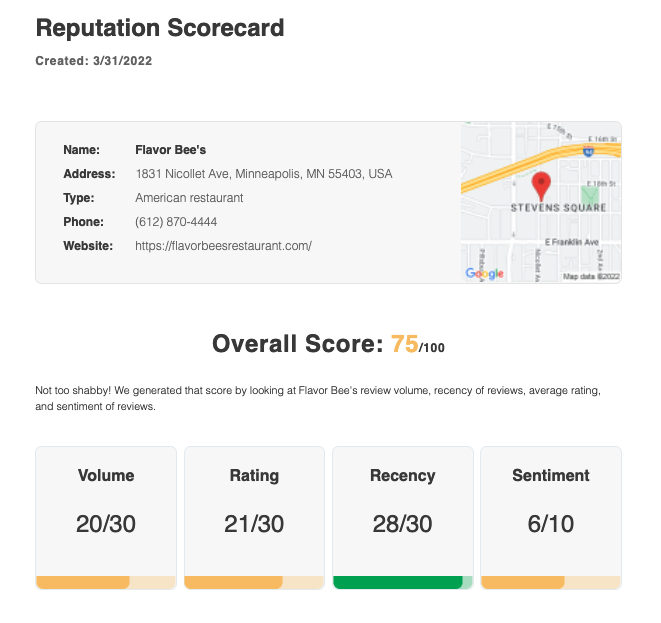
On the reputation scorecard you will see:
- An overall score – calculated by the four categories below.
- Average rating on all major review sites
- Volume of reviews
- Recency of reviews
- Sentiment value on Google reviews
How to use the reputation scorecard
The scorecard shows relevant ratings across various listings. Businesses usually have customer reviews or ratings on Google, Yelp, Facebook, or other industry-specific sites. The Reputation Scorecard compiles all of these customer star ratings and shows you platform-specific averages and an average score across the board. The comparison versus competitors consists of Google review metrics only.
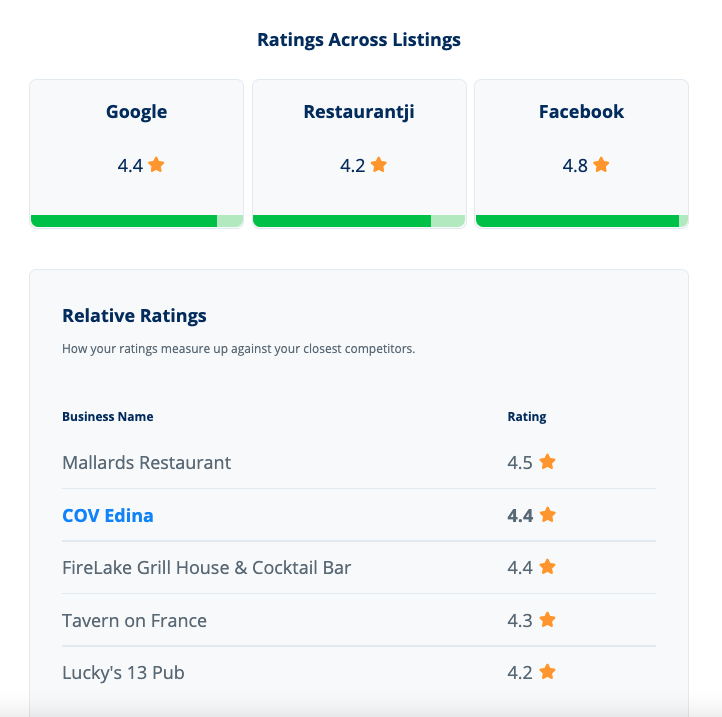
Using the “Relative Ratings” section, you can compare how businesses measure up against their competitors. See where the business ranks for customer star ratings and identify what to improve.
The overall score combines the review volume, rating, recency, and sentiment value. A higher score means the business has a stronger online presence. These scores help you show your prospects you know what you’re talking about! You can pick out key data points and show potential clients you know where they need to improve.
For example, review volume demonstrates to potential customers that a business accepts, encourages, and values customer feedback. Potential customers want to see that businesses value their current customers and their feedback.
Review volume is also a key local search ranking factor. Google evaluates business prominence, review volume, as well as ratings to calculate a business’s local search ranking.
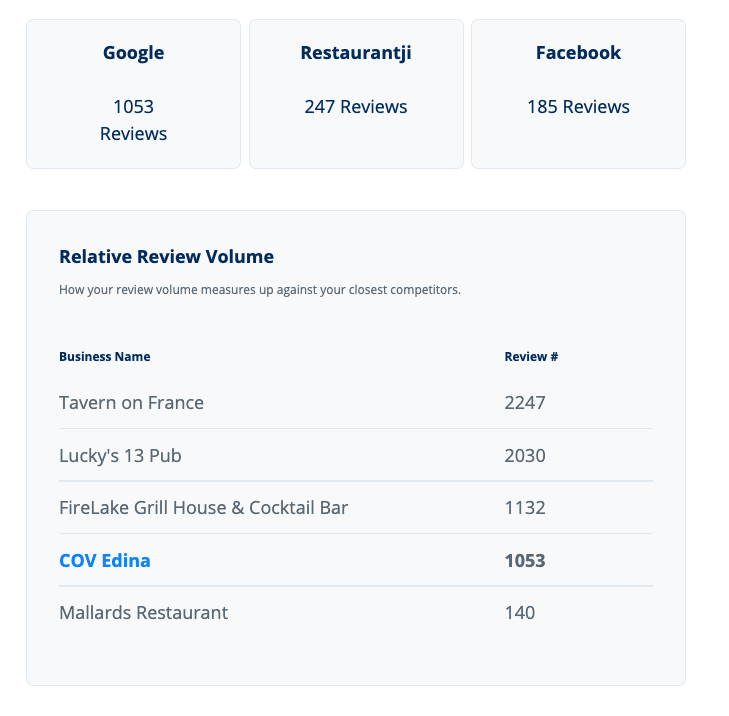
For example, a prospective business with a strong rating but few reviews needs to boost its volume. You could tell them that 66% of consumers stated many online reviews make them trust a brand online. Or you could say that buyers require an average 40 online reviews before believing a business’s star rating is accurate.
You can then demonstrate to them how you can automate the review request process to ensure they’re asking all customers for a review in a timely manner.
For businesses with ratings that need improvement, you could tell prospects that locations that move their Google Business Profile’s rating from a 3.5 to 3.7 stars experience conversion growth of 120%. Next, you can explain how automating review requests usually increases the average rating.
Recent reviews are more important than reviews from many years or months ago. It’s essential for businesses to keep a steady stream of reviews on multiple sites. Begin an email or text review request campaign with GatherUp. Or use an integration like our new Google Sheets integration to make the process of adding customer data to GatherUp seamless and error-free.
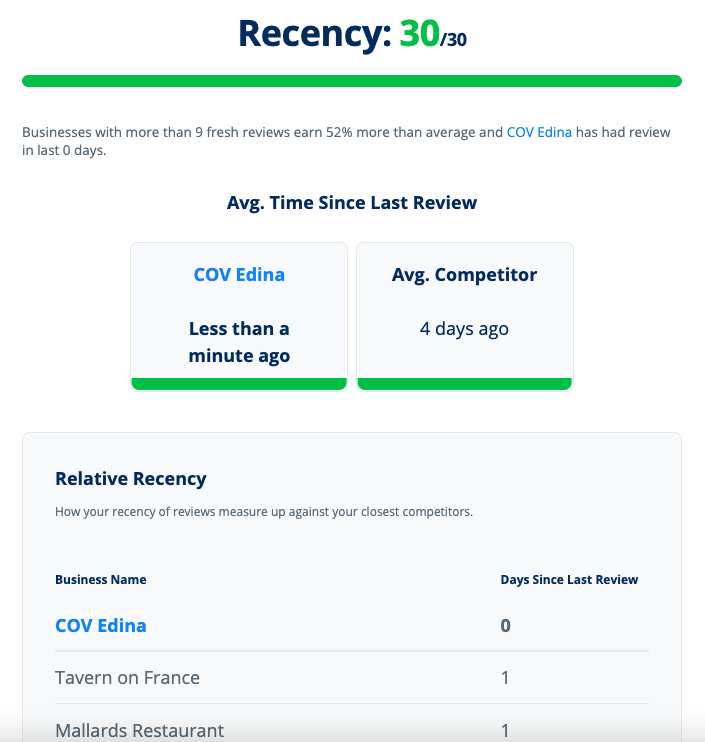
Review sentiment is calculated using Google’s review summary. We then use IBM’s Watson, the same system that powers our Insights Report, to perform the sentiment analysis so you can more easily understand how customers feel about your prospects’ businesses.
Put simply, the GatherUp Reputation Scorecard provides your agency with data points that are valuable for pitching new prospects and demonstrating value to current customers.
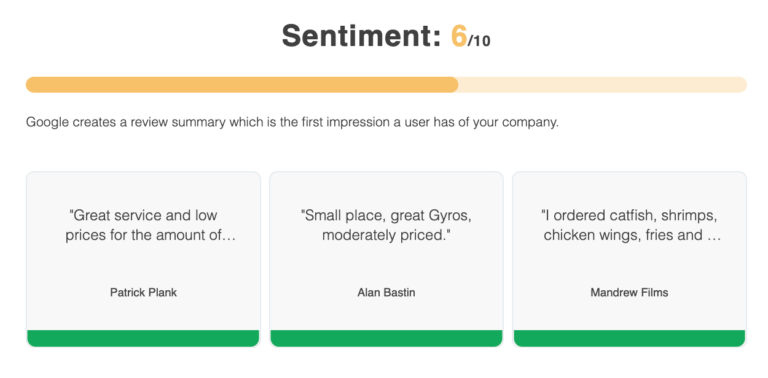
How can the reputation scorecard help your agency business scale?
By using the scorecard you can capture more leads, demonstrate your value to potential and current customers as well as boost customers’ ROI in reputation management.
Lead generation tool
Currently, our Reputation Scorecard is only available for agency account owners or administrators. The scorecard is a valuable lead generation tool for agency businesses as they prospect new clients. It’s easy to see how your prospects compare to their competitors and what they need the most help with.
Implement the Reputation Scorecard widget on your agency’s website and watch the leads come in. Your prospects fill out the form and a white-labeled report is sent to their email.
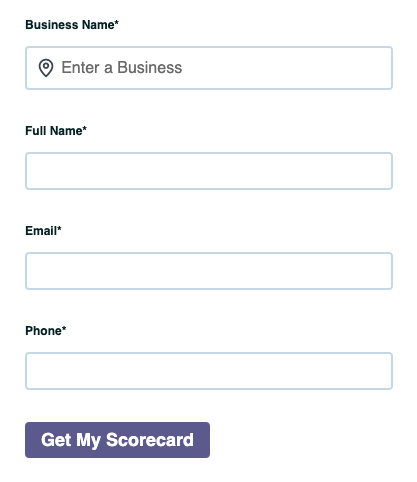
Show the value of your reputation management service. The widget is a great way to begin reputation management conversations with new leads or prospects!
Use sales tips from this webinar from agency expert and GatherUp sales leader, Chris Walker
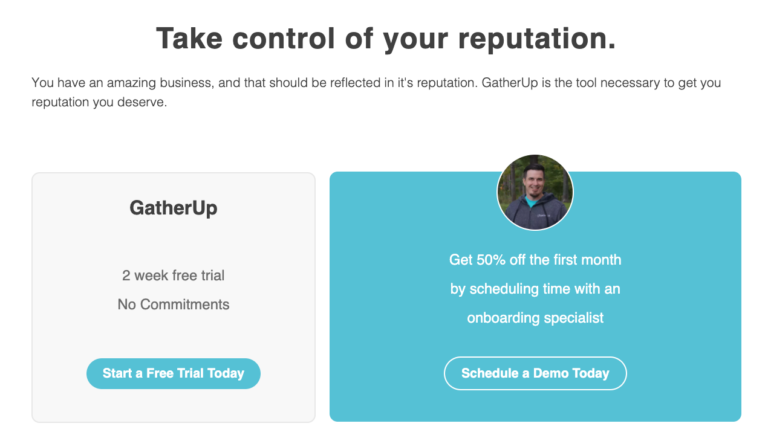
Help your clients measure their progress
By sharing the reputation scorecard with your clients, you can show them their progress. It’s easy to share key metrics like review volume, sentiment, and recency in a visual display.
By using the scorecard you’re starting with a benchmark, a standard on which you can measure your progress. You can see where the customer started when compared to competitors.
Pull reports on a monthly, quarterly, or yearly basis to see how they’ve improved their online reputation since using your services.
Stay on top of your customers’ competitors by pulling reports on their performance. If your client has 2-3 key competitors, you could run regular reports and see how their performance changes over time. You could track these metrics in a spreadsheet. You could then create visual charts to show your clients how their competitors are doing compared to them.
When your customers can see their progress, they’ll understand your value as a reputation management agency and be more likely to continue using your service. You can also use your customers’ progress data as a way of demonstrating to prospects what your agency is capable of doing.
Use the GatherUp Reputation Scorecard to scale up your agency
Our reputation scorecard will help you deliver more insight to potential and current clients. Agencies can paint a more accurate picture of their client’s current online reputation.
Use the widget to create an inbound lead-generation campaign that provides value for prospects.
Show ROI, track progress, and compare them versus their competitors. The key is to identify the prospects most likely to benefit from your services and earn their business!
Ready to scale up your agency? Schedule a free GatherUp demo today.
